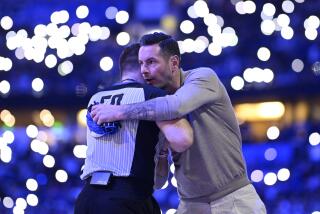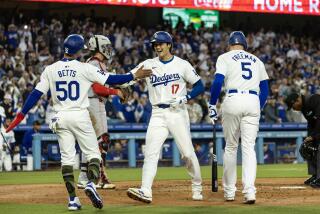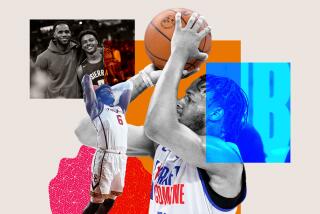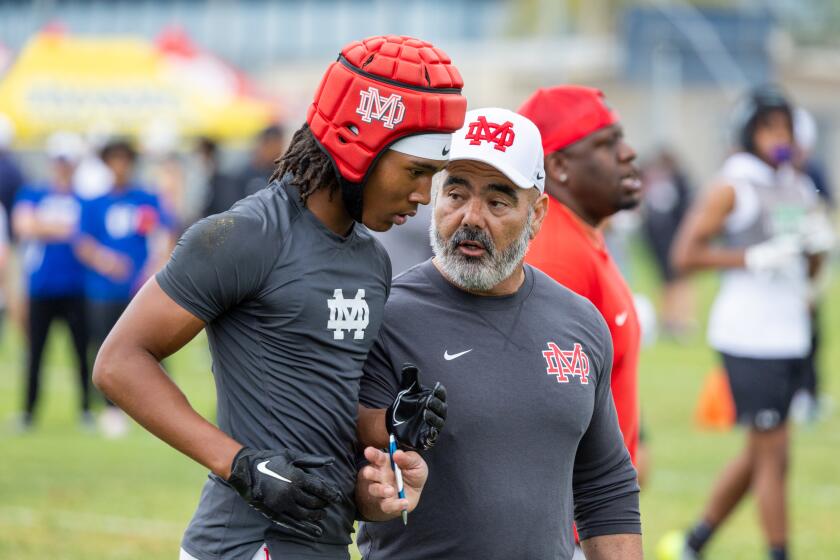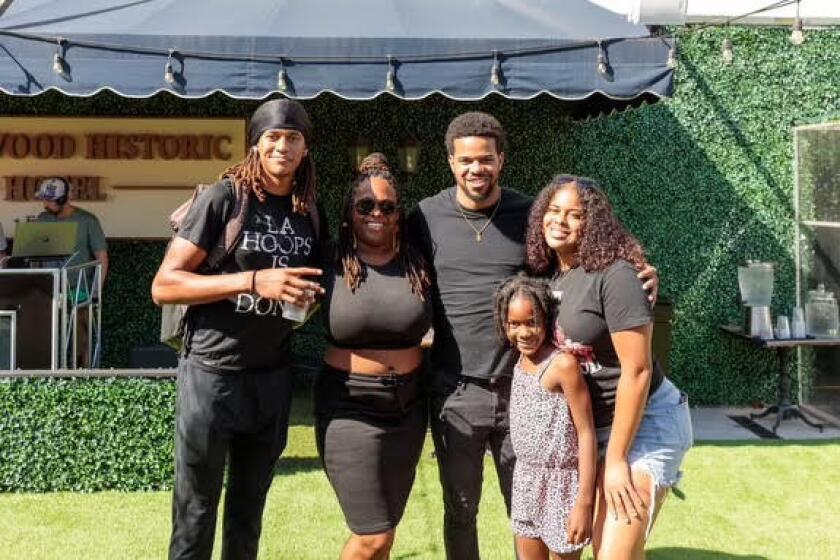Ex-Titan Jones Tries to Keep Up With Basketball : Career: Shooting helped keep him back, but he is playing in summer leagues to get a chance at the NBA.
Long Beach Poly High is a far cry from the Summit in Houston. Then again the Pacific Basketball League--a fledging, first-year summer pro package made up of six teams--is a far cry from the NBA.
Not that it matters to Derek Jones, a 6-foot-7, 200-pound forward from Cal State Fullerton who is considered the league’s best all-around player. A guy some thought would have been in the NBA by now. But life doesn’t always go as planned.
“It’s been a dream of mine to play in the NBA since I first picked up a basketball. And it’s still in the back of mind,” Jones said. “If it happens fine, it not, I won’t be disappointed.”
Any hopes of an NBA career ended nearly eight years ago when Jones was shot at close range in the back and left arm, and nearly died. He still lacks feeling in his left hand.
Jones was told he would never play basketball again. He has spectacularly refuted that prophesy. After rehabilitating himself and practically relearning the game from scratch--a natural left-hander, he is now ambidextrous--he has played pro basketball in Mexico and the ASICS Southern California Summer Pro League. He will play in the summer pro league for a fifth year when it begins its season July 12 at the Pyramid.
His team here, the Long Beach Panthers, finished third during its 10-game, five-week regular season, but went on to win the playoffs. Many Pacific Basketball League players are not complete players. Some can shoot but not pass. Some can rebound and defend but not score.
Jones did it all. He was second in the league in scoring, averaging 31.6 points. He was third in rebounding at 10.6. He also averaged 4.2 assists and 2.6 blocks.
“You ask anyone who plays in this league, and if they’re honest they will tell you he is the best--by far,” said Roland Prevo, coach of the Los Angeles Skywalkers who lost to Jones’ team in the playoff semifinals.
At 29, however, Jones is wondering how much longer he should pursue a professional career.
He has a wife and daughter. He has worked for the Long Beach Parks and Recreation Department the last five years. And he has started coaching--the Long Beach Poly girls’ freshman-sophomore team. He also has been an assistant on the girls’ varsity (which won its first Southern Section title last season.)
“I figure if you’re playing in league like the PBL, which has potential, the scouts will come. It’s not my main purpose. If you have the skills you get noticed,” Jones said.
“I play because I still enjoy the game. As long as I’m able to play and feel good, and have the desire, I’ll keep playing. At this point I’m not playing for notoriety. If I could play forever I would. I’m probably the most happy when I’m playing.”
He’s also happy to be alive.
Until Aug. 30, 1987, Jones didn’t have to worry about the future. He worked into Fullerton’s starting lineup as a junior, averaging 8.7 points and 5.7 rebounds.
That night, he was standing with eight men in front of his Long Beach apartment when a man pulled up in his car and asked about a drug purchase.
Jones said he had never involved himself in drugs and told the man so. But a 13-year-old boy came up and offered to make a sale. The man in the car gave money to the boy, who ran off. The man got out of his car to give chase. The group, protecting the boy, attacked the man but Jones stopped the beating and helped the man back to his car.
All but Jones and another man had left the area when the driver returned five minutes later and started firing the shotgun. The blast knocked Jones seven to eight feet.
“It was like getting hit with a sledgehammer,” Jones said. “I didn’t realize I was shot until I tried to get up and could not push up.
“You could smell the burning skin.”
Jones was put on life-support at the hospital, slipped into a coma that night, and his family was told he might not make it through the night. He was unconscious for four to five days.
But he survived.
It took nearly two years to recover, but Jones finished his Fullerton career (which included a rarely granted sixth season) in 1988-89. Starting all 29 games, he averaged 11.5 points and 6.9 rebounds.
By 1992, Jones felt he had recovered as much as he ever would.
“I don’t think all the motor skills are in place, but I learned to adapt,” Jones said. “I learned the game all over again from the right side. It felt backward. In daily life I take things more slowly. I still have to watch my left hand; once I broke it playing basketball and I couldn’t feel it.”
His agent, Jerry Clark--an Orange County businessman who put together the Long Beach league, and who will coach the summer pro league team Jones will play on--continues drumming up interest in Jones.
“With Derek, it’s a tough call,” Clark said. “If an overseas team would pay him $50,000 or more on a multiyear contract he’d take it. It’s not worth him picking up and leaving for a one-year deal. Even with a guaranteed contract there are no guarantees.
“My opinion is he’s good enough to be in the NBA. But that got sidetracked. Without the shooting he had a straight path to the NBA. With all things he can do for a team, you know you can win.”
Jones said he will be in his best possible condition for the summer pro league. He will play as hard as he can, as long as he can.
Whatever happens, happens.
“In the beginning I did feel cheated,” Jones said. “I felt whoever controls our destiny was being unfair. I didn’t feel I deserved this; I’m not a saint but I feel I’m a good person. I was trying to help someone. And I would do it all over again if it meant saving a life. The left hand . . . is nothing major.
“I still sit back and watch an NBA game and come up with the what-ifs. But you take the good with the bad. I’m still alive; that’s most important. I’m grateful for what I have, not for what I don’t have.”
More to Read
Get our high school sports newsletter
Prep Rally is devoted to the SoCal high school sports experience, bringing you scores, stories and a behind-the-scenes look at what makes prep sports so popular.
You may occasionally receive promotional content from the Los Angeles Times.
